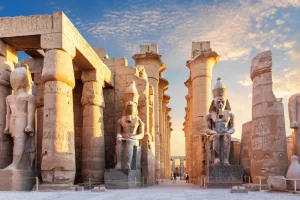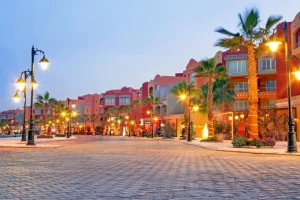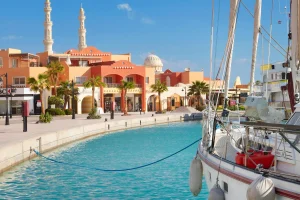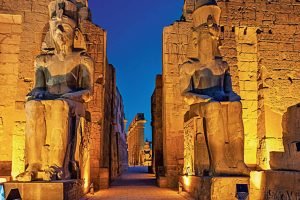Egypt

Travel to Egypt
Egypt is a land of timeless wonders, where ancient history meets modern vibrancy. Famous as the cradle of one of the world’s greatest civilizations, it’s home to the iconic pyramids of Giza, the mighty Nile River, and countless archaeological treasures. But Egypt is more than just its ancient heritage—it also offers bustling cities like Cairo, serene beaches on the Red Sea, and charming towns along the Nile.
Whether you’re exploring the Valley of the Kings, cruising the Nile on a traditional felucca, or diving into the crystal-clear waters of Sharm El-Sheikh, traveling to Egypt is an adventure filled with discovery and awe. This fascinating country has something to offer every traveler, from history buffs and nature enthusiasts to food lovers and beach seekers.
Key facts for Egypt
Capital city
Cairo
Population
Approximately 105 million
Offical language
Arabic
Currency
Egyptian Pound (EGP)
Power Plugs
220V, Plug Types C & F
Climate
Desert climate, with hot summers and mild winters
Religion
Islam, with a Christian minority
Timezone
Eastern European Time (EET, GMT+2)
Culture
The culture of Egypt is a rich tapestry woven from its ancient roots and modern influences. Egyptian culture is deeply tied to its history, with monuments, temples, and artifacts reflecting the grandeur of the pharaohs. Religion also plays a significant role, with Islam being the predominant faith and Christianity contributing to the country’s unique cultural blend.
Family and hospitality are central to Egyptian society, and visitors are often greeted with warmth and friendliness. Traditional music, dance, and crafts like pottery and weaving remain integral to local life. Egyptian cuisine, including dishes like koshari (a savory mix of rice, lentils, and pasta) and falafel, offers a flavorful dive into the culture. Exploring the culture of Egypt is an enriching experience that connects you with its vibrant traditions and history.
Best time to visit
The best time to visit Egypt is between October and April, when the weather is cooler and more comfortable for sightseeing. During this period, daytime temperatures are mild, making it ideal for exploring outdoor attractions like the pyramids, temples, and desert landscapes.
Summer months (May to September) can be intensely hot, especially in southern regions like Luxor and Aswan, but it’s a great time for relaxing by the Red Sea or taking advantage of fewer crowds at major sites. Planning your trip around the best time to visit Egypt ensures you make the most of your journey, whether you’re wandering through ancient ruins or snorkeling in the vibrant coral reefs.
Shopping Experience
Shopping in Egypt is a delightful mix of traditional bazaars and modern malls. The bustling Khan El Khalili market in Cairo is a must-visit, offering handmade crafts, jewelry, spices, and textiles. Luxor and Aswan are known for their vibrant souks, where you can find alabaster carvings and colorful scarves.
For a more contemporary experience, head to City Stars Mall in Cairo or Hurghada’s Marina Boulevard. Popular items to take home include papyrus art, perfumes, and Egyptian cotton products. Bargaining is a common practice in traditional markets, adding to the fun of shopping in Egypt. Whether you’re looking for unique souvenirs or luxury goods, Egypt offers a shopping experience to remember.
Climate
The climate in Egypt is predominantly desert, with hot, dry summers and mild winters. Summer temperatures can soar above 40°C (104°F), particularly in southern regions, while coastal areas like Alexandria enjoy a more moderate climate.
Winters (December to February) are pleasant, with daytime temperatures ranging between 14°C to 22°C (57°F to 72°F), making it the best time for sightseeing. Rainfall is scarce, but occasional showers occur in northern cities like Alexandria. Understanding the climate in Egypt helps you prepare for the weather and pack appropriately for your trip.
Safety
Egypt is generally a safe destination for tourists, with popular areas like Cairo, Luxor, Aswan, and the Red Sea resorts being well-secured and visitor-friendly. Tourism is a vital part of the economy, and the government places a strong emphasis on ensuring the safety of travelers.
However, it’s important to stay updated on travel advisories and respect local customs and laws. In busy urban areas, keep an eye on your belongings and be cautious of scams. When traveling to remote areas, consider joining guided tours for added security. Being mindful of safety in Egypt allows you to explore this captivating country with peace of mind.









